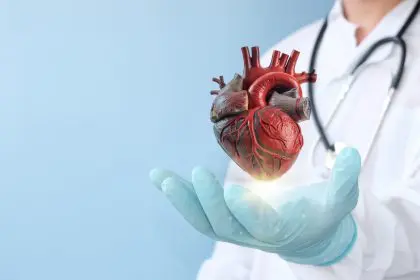Many people dismiss heartburn as an unavoidable part of life, particularly after enjoying spicy foods or eating too close to bedtime. While occasional acid reflux affects millions of Americans, certain symptoms can signal a more serious underlying health condition that requires medical attention. This comprehensive guide explores five key warning signs that your persistent heartburn might merit a visit to your healthcare provider.
When heartburn becomes chronic
Heartburn, that familiar burning sensation in your chest, occurs when stomach acid flows back up into your esophagus. For most people, it happens occasionally and can be managed with over-the-counter medications and lifestyle changes. However, when heartburn becomes a regular occurrence, showing up twice a week or more, it may indicate gastroesophageal reflux disease (GERD).
GERD is a long-term condition where stomach contents regularly flow back up into the esophagus, causing irritation and inflammation. While GERD itself isn’t immediately life-threatening, chronic inflammation can lead to complications if left untreated, including esophageal strictures, Barrett’s esophagus, and in rare cases, esophageal cancer.
The first sign that your heartburn may be something more serious is its frequency and persistence. If you find yourself reaching for antacids multiple times per week or your symptoms don’t improve with over-the-counter remedies, it’s time to consult a healthcare professional.
Trouble swallowing accompanies your heartburn
The second warning sign is developing difficulty swallowing, known medically as dysphagia. This symptom may begin subtly – perhaps you notice food doesn’t go down as smoothly as before, or you feel like you need to swallow multiple times to clear your throat.
As this symptom progresses, you might find yourself avoiding certain foods that seem to get “stuck” or cause discomfort when swallowing. Some people describe the sensation as food becoming lodged in their throat or chest.
Dysphagia with heartburn can indicate several serious conditions, including esophageal stricture (narrowing of the esophagus due to repeated acid exposure), esophageal rings or webs (tissue formations that narrow the passageway), or even tumors. The combination of persistent heartburn and progressive difficulty swallowing warrants prompt medical evaluation.
Pain that radiates beyond your chest
The third red flag is when your chest pain extends beyond the typical burning sensation associated with heartburn. While normal heartburn typically causes a burning feeling behind the breastbone that might travel up toward your throat, more concerning symptoms include pain that spreads to your jaw, neck, arms, or back, pressure or squeezing sensations in your chest, and symptoms that mimic a heart attack.
This pattern of pain distribution is particularly concerning because it can sometimes be difficult to distinguish between severe heartburn and a heart attack. Both conditions can cause chest pain, pressure, and discomfort that radiates to other areas of the upper body.
The challenge in differentiating these conditions underscores why persistent or unusual chest pain should never be ignored. When in doubt, seek emergency medical attention – it’s always better to rule out a heart attack than to dismiss potentially life-threatening symptoms as “just heartburn.”
Unexpected weight loss occurs with your symptoms
The fourth warning sign is unintentional weight loss alongside your heartburn symptoms. When you begin losing weight without trying – particularly if you’re losing more than 5% of your body weight over six to twelve months – it’s time to take notice.
This combination of symptoms could indicate several serious conditions. Esophageal cancer, while relatively rare, increases in risk with persistent heartburn, especially when combined with unexplained weight loss. Stomach cancer, though less common in Western countries, can present initially as persistent indigestion and gradual weight loss. Pancreatic issues can affect digestion and cause both reflux symptoms and weight changes. Inflammatory bowel conditions can disrupt normal digestive processes, leading to nutritional deficiencies and weight loss.
The human digestive system normally maintains a delicate balance. When that balance is disrupted significantly enough to cause weight loss alongside reflux symptoms, it typically indicates a condition requiring medical intervention.
Nighttime symptoms disrupt your sleep
The fifth warning sign involves the timing and impact of your heartburn symptoms, particularly when they regularly wake you from sleep or prevent you from resting comfortably.
Nighttime reflux differs from daytime symptoms in several important ways. When you’re lying down, gravity no longer helps keep stomach acid where it belongs. This horizontal position makes it easier for acid to travel up into your esophagus and even reach your throat and mouth.
People with severe nighttime reflux may experience waking up coughing or choking due to acid reaching the throat, morning hoarseness or sore throat, chronic cough that worsens at night, and asthma symptoms that flare during sleep.
These nighttime symptoms are particularly concerning because they indicate that acid is likely traveling further up your digestive tract, potentially damaging your esophagus, throat, and even your lungs through aspiration of small amounts of stomach contents.
Studies have shown that nighttime reflux is associated with more severe damage to the esophageal lining and increased risk of complications including Barrett’s esophagus, a precancerous condition.
When to seek emergency care
While the five signs above indicate the need for medical evaluation, certain symptoms require immediate emergency attention. Severe chest pain, especially with shortness of breath, jaw or arm pain needs immediate care. Vomiting blood or material that resembles coffee grounds should prompt an ER visit. Black, tarry stools indicate potential internal bleeding requiring urgent attention. Feeling lightheaded, dizzy, or faint along with digestive symptoms may signal a serious condition.
These symptoms could indicate a heart attack, gastrointestinal bleeding, or other medical emergencies that require immediate intervention.
Taking action for better digestive health
Understanding these warning signs empowers you to advocate for your health. If you recognize any of these serious indicators, schedule an appointment with your healthcare provider. Depending on your symptoms, they may recommend tests such as upper endoscopy to visualize your esophagus and stomach, esophageal pH monitoring to measure acid exposure, esophageal manometry to assess muscle function, or imaging studies to rule out structural problems.
Early intervention not only relieves uncomfortable symptoms but can prevent serious complications down the road. With proper diagnosis and treatment, even chronic digestive conditions can be managed effectively, allowing you to enjoy food and life without constant concern about heartburn.
Remember that while lifestyle modifications like avoiding trigger foods, eating smaller meals, and not lying down after eating can help manage occasional heartburn, they shouldn’t replace medical care when these warning signs appear.
Your digestive health affects your overall wellbeing, and addressing serious symptoms promptly ensures the best possible outcome for your long-term health.
















